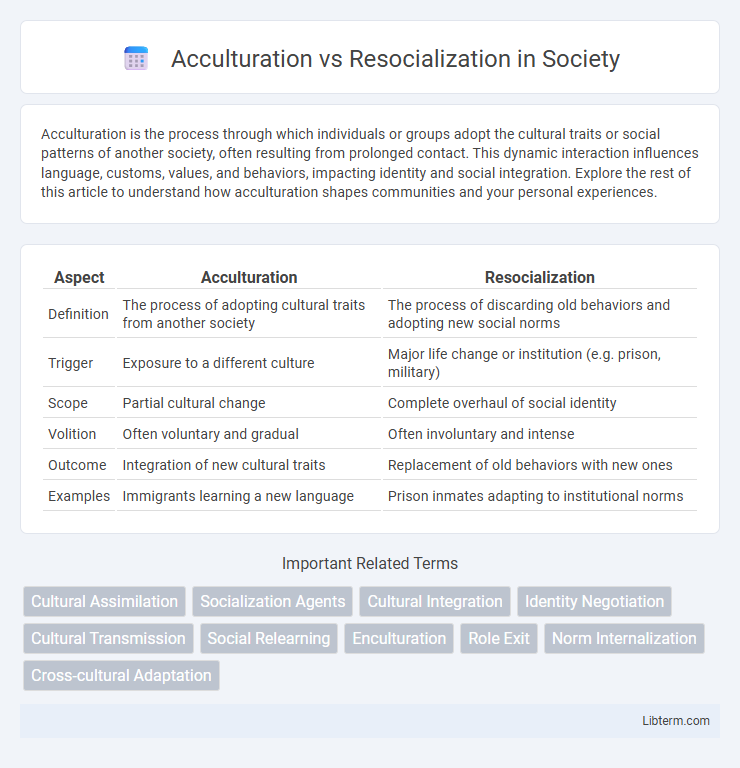Acculturation is the process through which individuals or groups adopt the cultural traits or social patterns of another society, often resulting from prolonged contact. This dynamic interaction influences language, customs, values, and behaviors, impacting identity and social integration. Explore the rest of this article to understand how acculturation shapes communities and your personal experiences.
Table of Comparison
| Aspect | Acculturation | Resocialization |
|---|---|---|
| Definition | The process of adopting cultural traits from another society | The process of discarding old behaviors and adopting new social norms |
| Trigger | Exposure to a different culture | Major life change or institution (e.g. prison, military) |
| Scope | Partial cultural change | Complete overhaul of social identity |
| Volition | Often voluntary and gradual | Often involuntary and intense |
| Outcome | Integration of new cultural traits | Replacement of old behaviors with new ones |
| Examples | Immigrants learning a new language | Prison inmates adapting to institutional norms |
Understanding Acculturation: Definition and Key Concepts
Acculturation refers to the process through which individuals or groups adopt cultural traits or social patterns of another group while maintaining elements of their original culture. Key concepts in acculturation include cultural assimilation, integration, marginalization, and separation, which describe different strategies individuals use to navigate between two cultures. Understanding these dynamics is crucial for analyzing how cultural exchange influences identity formation and social adaptation in multicultural settings.
What is Resocialization? An Overview
Resocialization is the process through which individuals undergo significant changes in their values, beliefs, and behaviors to adapt to a new social environment or role. This transformation often occurs in total institutions such as prisons, military boot camps, or rehabilitation centers, where previous norms are deliberately stripped away and replaced. Unlike acculturation, which involves adapting to a different culture while maintaining aspects of the original, resocialization demands a comprehensive re-learning and restructuring of identity.
Core Differences Between Acculturation and Resocialization
Acculturation involves the process through which individuals adopt cultural traits or social patterns of another group, often while maintaining aspects of their original culture. Resocialization entails a more profound transformation where a person's existing social values and behaviors are replaced entirely, usually within controlled environments like military training or prisons. Core differences include the extent of change--acculturation adjusts cultural identity, whereas resocialization restructures social identity and behavior comprehensively.
Stages of Acculturation in Cultural Adaptation
Acculturation involves stages such as contact, conflict, crisis, and adaptation, where individuals gradually adopt cultural traits from a new environment while maintaining aspects of their original culture. This process contrasts with resocialization, which entails a complete overhaul of existing behaviors and beliefs to fit into a new social context. Understanding the stages of acculturation is essential for analyzing how immigrants and cultural minorities balance identity transformation and cultural retention during adaptation.
The Process and Methods of Resocialization
Resocialization is the process through which individuals discard previous behaviors and adopt new norms, values, and roles, often occurring in total institutions like prisons or military boot camps. Methods include intense socialization practices such as supervised activities, strict schedules, rewards and punishments, and breakdown of old identity through techniques like degradation ceremonies. This structured approach contrasts with acculturation, which involves a more gradual adaptation to a new culture while maintaining some original cultural elements.
Factors Influencing Acculturation Outcomes
Factors influencing acculturation outcomes include the individual's cultural background, the degree of cultural similarity between the original and host cultures, and the social support systems available. Language proficiency, duration of exposure, and socioeconomic status also play crucial roles in shaping how effectively someone adapts to a new culture. Psychological resilience and the presence of discrimination or acceptance within the host society significantly impact the overall acculturation process.
Psychological Impact of Resocialization
Resocialization involves a profound psychological impact as individuals must unlearn previous behaviors and adopt new norms, often leading to identity confusion and stress. The process challenges deeply ingrained values, causing emotional discomfort but also potential personal growth through enhanced adaptability. Unlike acculturation, which entails gradual cultural adaptation, resocialization demands more intense mental adjustment due to complete restructuring of social roles and self-concept.
Case Studies: Acculturation in Immigrant Communities
Case studies of acculturation in immigrant communities reveal complex processes of cultural adaptation where individuals integrate elements of both their original and host cultures. Research highlights variables such as length of residence, age at immigration, and community support, which significantly influence the degree of cultural retention and adaptation. These studies underscore the dynamic interplay between maintaining ethnic identity and acquiring new cultural norms, contrasting with resocialization's more abrupt, structured redefinition of social roles often seen in institutional settings.
Resocialization in Institutions: Prisons, Military, and More
Resocialization in institutions like prisons, the military, and rehabilitation centers involves a deliberate process of unlearning previous behaviors and adopting new norms and values suited to the institutional environment. This intense socialization aims to reshape identity through structured routines, strict regulations, and role expectations, often leading to significant psychological and behavioral changes in individuals. Unlike acculturation, which adapts individuals to broader cultural contexts, resocialization focuses on transforming social roles within confined or specialized settings.
Acculturation vs Resocialization: Implications for Society
Acculturation involves the gradual adoption of cultural traits from one group by another, fostering multicultural integration and social cohesion in diverse societies. Resocialization entails a more profound transformation, where individuals discard previous norms and fully embrace new social roles, often seen in institutions like the military or rehabilitation centers. Understanding the distinctions guides policymakers in designing effective programs for immigrant adaptation versus behavioral reintegration, thereby enhancing societal harmony and reducing cultural conflicts.
Acculturation Infographic

 libterm.com
libterm.com